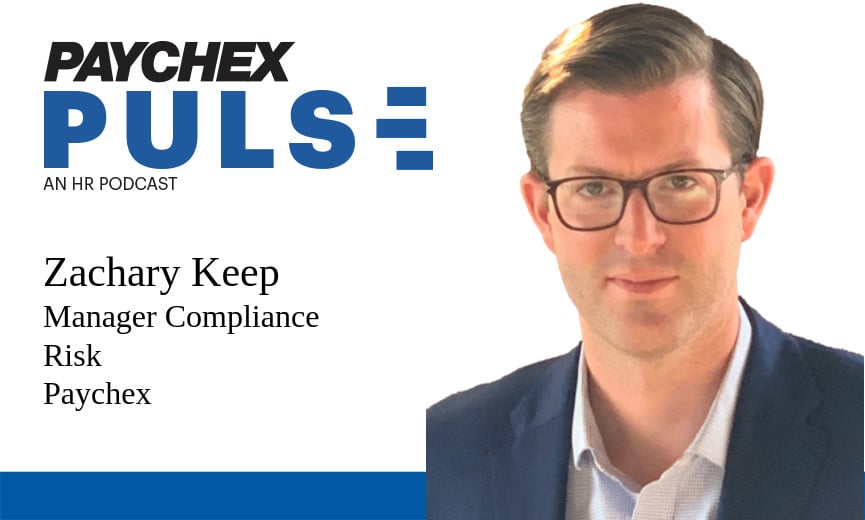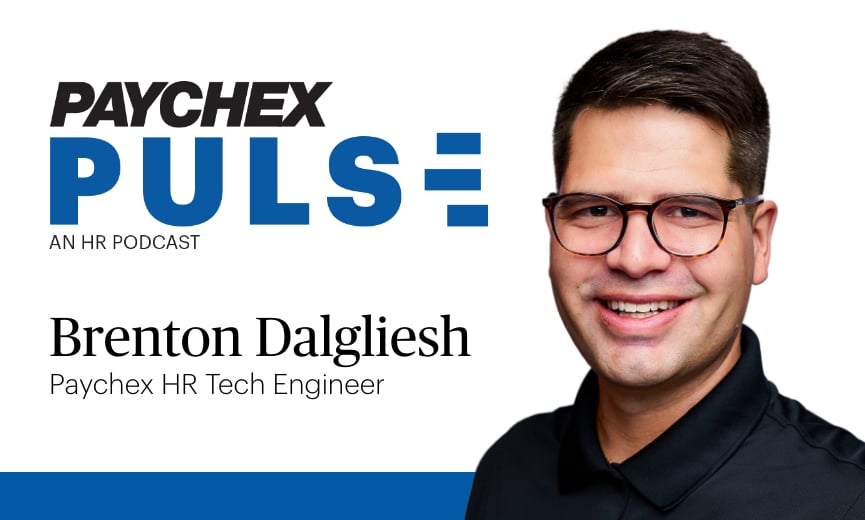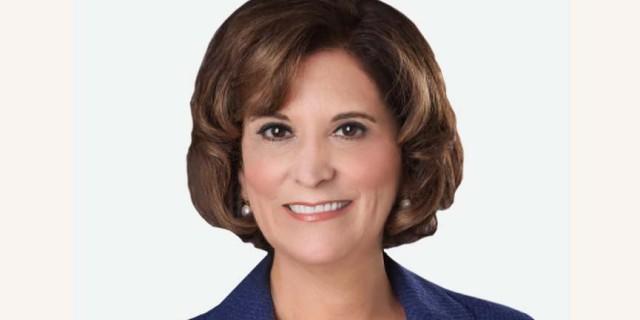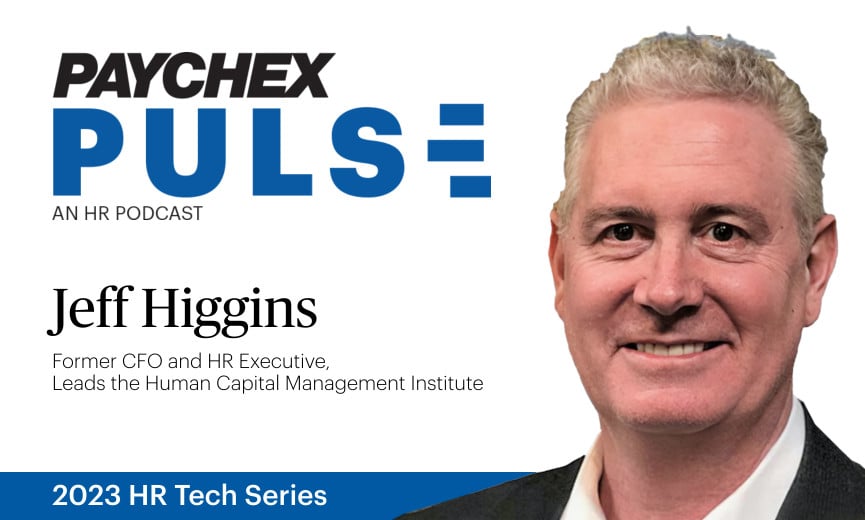Haga una lista y compruébela dos veces: el cumplimiento de recursos humanos a fin de año
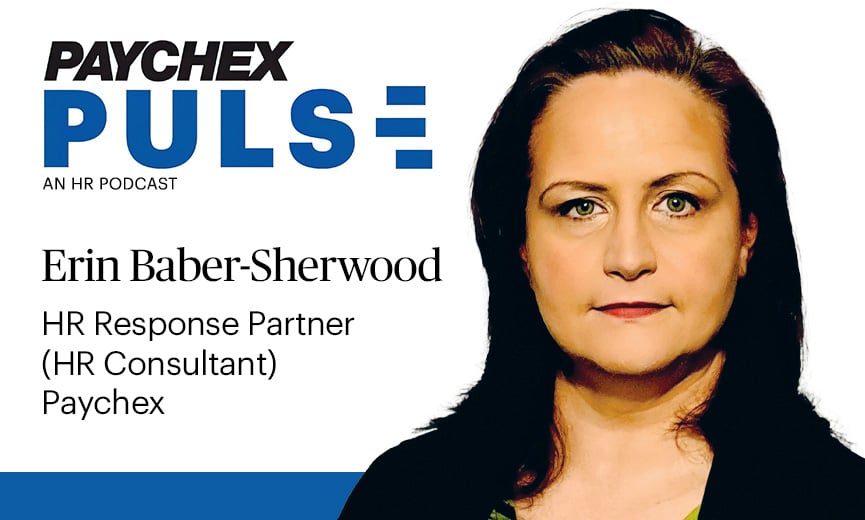
Podcast •

Vea
Resumen
As year-end approaches, it's time to tie up those loose ends and ensure your business and its people are primed to hit the ground running in the new year. On this episode of Paychex PULSE, Erin Baber-Sherwood, an HR professional with 25 years of experience, shares valuable tips and strategies for maintaining compliance during this busy time of year, including using a checklist. More important than Santa’s, this list acts as your guiding light — pointing you toward key information, important documents, and best practices to save you time, ensure you meet critical deadlines, and help you start 2024 on the right foot.
Topics include:
00:00 – Welcome Erin Baber-Sherwood
01:37 – The Importance of a year-end HR compliance checklist and what to include on it
07:35 – The role of digital communication at year-end
09:34 – Accounting for local regulations
12:11 – Planning ahead for a successful 2024
16:09 – Year-end organization best practices
17:43 – Erin’s final advice for listeners
18:21 – Wrap up
Connect with Erin:
> LinkedIn
Don’t forget to download your copy of our 2023 Year-end HR Compliance Checklist.
As you dive into the new year, you’re also diving into new regulations impacting businesses of all sizes. Take a look at the state laws on the horizon, here.
HR compliance isn’t just about avoiding legal repercussions. Learn how it promotes an equitable and safe work environment, while also protecting your business’s future by ensuring its growth is powered by ethical practices, here.
Need help closing out the year, remaining compliant, or completing any of the other countless HR tasks on your to-do list? Paychex can help.
Ver transcripción
Erin Baber-Sherwood (00:00)
I love that corollary between resolutions or your personal resolutions, as well as in reinvesting and recharging your staff. Taking a look at where are they? What are some of the kudos that you can offer right now, but also where do they want to go? Some of the things that we're seeing on a lot of the industry reports is that employees want to grow, they want to develop, they want to know and learn more. It's one of the pieces that keeps them engaged. So how are you going to approach training? Could you book out a training calendar for 2024? It's a great opportunity to think about it.
Rob Parsons (00:48)
Welcome to season four of Paychecks Pulse, an HR Podcast, where HR professionals can find great insights on today's top issues and be inspired to build and lead effective teams in a healthier workplace. Hi, everyone. Welcome to the Paychex Pulse Podcast. I'm Rob Parsons, your host. Joining me today is Erin Baber-Sherwood. As a certified HR professional with a degree in business administration, Erin brings over 25 years of business and HR experience across a variety of industries. Currently, Erin is a member of our HR community of Excellence, actively providing HR insights and guidance. Erin, welcome to the podcast.
Erin Baber-Sherwood (01:34)
Hi, Rob. It's so good to talk to you again.
Rob Parsons (01:37)
Fantastic. So today we're here to talk about a year-end HR compliance. I want to just call it a checklist, but year-end HR cleanup. We know businesses and HR leaders have a lot on their plates when it comes to closing out the year and prepping for what's ahead. I want to start by saying what's the very best way to keep track of everything?
Erin Baber-Sherwood (02:01)
Well, it sounds a little cliche, but this time of year is a good time of year for lists, making lists and checking them twice or even more often. So, I would say that a checklist is definitely the way to go. Just like you have your mailing lists and your shopping lists here and within your HR focus, you're going to want to make sure that you have your checklist of all those things you want to button up at this tail end of the year.
Rob Parsons (02:25)
So, as we're talking about that list, I know I prioritize a lot of things. I like little open checkboxes next to it so I can get through there. And I try to put the important things in a certain place so there's some hard dates we have to look at, aren't there?
Erin Baber-Sherwood (02:40)
Absolutely there are. So, there are those that are static and stay ready each year, time over time. Right. So, one of those would be the W-2s something that we hear a lot about, that filing date is January 31. We want to make sure that two aspects of that date get met. One is we want to make sure that we're getting all of the documents that the employees need, i.e. their W2s, as well as making sure that we file those W2s with the Social Security Administration. Both of those things have to be accomplished no later than January 31. So again, we're providing it to the employees by that time, and we're filing it with the Social Security Administration. Additionally, we have other responsibilities that are hard-coded in time. So, if an employer is, in fact, subject to the Affordable Care Act, or the ACA, as we're typically calling it, they also need to be providing documentation to their employees. Specifically, it's the Form 1095-C. That document has to be provided to their employees no later than March 4. Now, of course, not just to the employees, but the employer also has to provide the corresponding 1095-C and the 1094-C to the IRS. And that deadline is going to be dependent upon whether the company is elected to do that in paper or if they've elected to do it electronically. So if you're doing it a paper form, you're going to need to make sure that you file that with the IRS no later than February 4. If, however, you've elected to file electronically, then you have until April 1 to be able to get those documents in. So those are the primary, every year we think about kind of documents. It's usually quick on our minds. There are a couple of others that I want to add in there just so we don't overlook them. That would be the filings for FICA and FUTA. So, FICA, another acronym, because you know how we love our acronyms, is a shorthand version.
Rob Parsons (04:54)
Especially the IRS.
Erin Baber-Sherwood (04:55)
Exactly. Especially the IRS. That is a shorthand for referencing Social Security and Medicare. And so, we reconcile those every quarter. It just so happens that there is a fourth quarter that ends at the end of the year. And so, we have to get that reconciled by January 31 of the following month, which is January 31. So that would be on the Form 941. And then, of course, FUTA, which is the federal unemployment tax, also has to be reconciled, and that would be Form 940. So, all of those things would be added to that checklist with those checkboxes to make sure that we hit all of those dates and all of those requirements.
Rob Parsons (05:41)
Those are good hard dates. I think I need a calendar and a checklist and an online access to all the forms because you just rattled off a bunch.
Erin Baber-Sherwood (05:48)
I did rattle off a lot of forms because they are a regular occurrence in an HR world.
Rob Parsons (05:56)
So, I know there's other paperwork in the HR world that we don't necessarily have a hard date. And I'm thinking specifically, when I hire an employee or let somebody go terminate an employee, there's windows of activity that have to take place there, too. So how do I account for that? How do I build that into my checklist?
Erin Baber-Sherwood (06:16)
Yeah, so I would say that it's always a good idea to have checklists built around those once in a while circumstances, like a new hire. So having a new hire checklist, making sure that you've got those things that come up only when you are hiring, so that you don't forget that you have to have an I-9 and you have to have a W-4 and all of those key pieces. Also, like you mentioned, time of separation, we also have those key things we have to accomplish at that point. So, a separation checklist is another key tool to have in the arsenal because you want to be able to remember in the heat of the moment what needs to be accomplished. So, during that process, the whole point of those kinds of checklists is really to make sure that we are hitting all of the requirements, and we want to double-check and confirm the details. So, verifying the information is really what it comes down to. Employee name, address, Social Security number. Errors in those cause big problems. So, we want to make sure that we're verifying the information as we're going through. So that's a key piece during hire and separation. Another consideration to add to that termination checklist would be where do they want their W2 to go? Because they may be moving, they may know that they're moving, et cetera. You want to make sure that you have all of that up-to-date information as best as possible so that you're ready when you're doing all these steps.
Rob Parsons (07:53)
Are emails a required part of this? The reason I ask is I know that there's been a lot of movement towards digital W2s and a lot of this, you'd mentioned it with some of the forums earlier. Is being done digitally. Is any of that being required by the government right now, or is that a step employers are just taking to make life faster and easier?
Erin Baber-Sherwood (08:10)
Great question. Depending on the government, depends on how much they're leveraging the digital world. We are seeing signs that the federal government is starting down that path, but they've not yet fully embodied it. In fact, it was very novel and that they just announced here recently that they would allow for folks, they're starting to allow more folks to file electronically for the IRS, whereas before they were very much stuck to paper and they would only allow companies to file. So they're making some progress on the federal level. Some states are a lot more advanced than that. Not a surprise. But what I would say is that what employers are able to do electronically is show up for their employees so much easier, because in this digital world, there are so many concerns about timeliness, there's concerns about privacy. And so by building in and using a digital secure portal, employers are really able to leverage that extra power to be able to get information to the employees when they need it, when they want it, in a secure way so that they can access their own check stubs and access their own W-2s in a way that they're not feeling like they're exposing themselves to any kind of identity theft concerns.
Rob Parsons (09:34)
It makes a lot of sense. I just also know just from my own daughters, they do everything on their phones. The last thing they want is something mailed to them paper-wise. I'm really glad you brought up the state topic. How does my state, now we've been talking federal, how does my state come into play in my year-end checklist?
Erin Baber-Sherwood (09:53)
So, it would depend on the state. So, there's a couple of things that you're going to want to consider when you're thinking about the state. One is what filings do you need to make? So, like I mentioned, the reconciliation of tax forms. So that 941 that I rattled off and that Form 940, there are also state forms that employers are going to need to file. So, you'll want to make sure that you check in with your state to confirm those. Of course, if you've got a payroll partner, they're going to be able to help you and identify those, as well as any local jurisdictions that you have to be filing for. The other consideration, though, about states, that's really important right now, this time of year especially, is keeping an eye on those legislative changes that have come about, because it is one of those thresholds that we like to make change about. So there are a lot of states that have enacted changes. They've enacted changes around minimum wage. They've enacted changes around the minimum salary for exempt employees, et cetera. So being alert to what's going on in your state, especially around wage and hour considerations, is a huge thing to add to your checklist. And that's not even thinking about some of those tax considerations, because there are tax wage bases. Right. So there are some federal and still some state taxes that have a certain amount of wages or they have a wage base where once an employee exceeds that amount, no more tax is taken. So, at this point in the year, they've probably already met all of those wage bases. But first of the new year, they're all going to start all over again. They're going to need to be alert to, all right, are we kicking back in? So, some of the most common examples would be Social Security and Medicare. So being alert to those is a definite key piece, especially if you have to be reporting to the budget people. They need to know that what isn't on the budget right now and is not coming out is going to kick back in at the beginning of the year. So it's an important piece to add into your consideration list.
Rob Parsons (12:11)
That's really interesting, that whole cash flow impact. We've been talking a lot about what I have to do, but there's a lot of things as I look to the year ahead maybe that I want to do. I want to be thoughtful about my business. I want to be thoughtful about compensation. I want to be thoughtful about training, onboarding, upskilling, succession. And like you said, it's a nice time to take stock and look ahead. How would you recommend getting a jump on the new year and really laying the groundwork for a successful 2024?
Erin Baber-Sherwood (12:44)
I love that corollary between resolutions or your personal resolutions, as well as reinvesting and recharging your staff, taking a look at where are they? What are some of the kudos that you can offer right now? But also where do they want to go? Some of the things that we're seeing on a lot of the industry reports is that employees want to grow, they want to develop. They want to know and learn more. It's one of the pieces that keep them engaged. So how are you going to approach training? Could you book out a training calendar for 2024? It's a great opportunity to think about it. In addition, time off is so important, especially when we're thinking about holidays. Right? Who doesn't want a little bit of extra time to spend with loved ones? Well, what about the rest of the year? How have you built in time off policies for your staff so that they get to recharge and have time to spend doing the things that recharge their energy so that they can bring more to the table with you? Plus, back to that legislative action. There are certain jurisdictions that have made changes around what is required for time off. So you'll want to take a look at all of those collectively and come up with a plan. But you mentioned that there are other things that happen around this time that we kind of need to anticipate. One that I think gets slipped and we miss is this time of year brings about some bad weather in a number of different areas across the country. And so it's a really good time to double-check your business continuity plan. What have you got in place? If there's bad weather, if there's something that impacts your business, how are you ready to handle that? So thinking through that, and if you're lucky enough to be at a part of the country where it's not bad now, but you can anticipate that it's coming, it's still a good time to think about how you're going to be prepared when the unpreparable shows up. Right. So, thinking through those kinds of things, the other piece that I think is really helpful in that overall, just thinking ahead is when you're talking about compensation, what can you budgetarily handle? What can you give back? Are there year-end pieces that you've already built in that you need to account for this year, or are you planning to do bonus structures or incentive plans coming up? So that's a piece that you're going to want to definitely take a look at when you're thinking through all of those pieces about the future. And then I'd be remiss as an HR professional, Rob, if I didn't tell you at least once in an HR conversation to look at the employee handbook. So, with all of the changes that I just mentioned, state, local, and any changes you're going to make about your own internal practices, you're going to want to represent that in the employee handbook. That is what sets expectations within your organization, clarifies what can be realistically anticipated. So, it's a good time to take a look at it now, if you haven't already.
Rob Parsons (16:09)
You've listed off a lot of resolutions. There's a lot to keep track of. Do you have a favorite process or a favorite tool, or how do you keep track of all of this?
Erin Baber-Sherwood (16:24)
It is a daunting task. Any HR professional will tell you that there are lots of push and pulls, so everybody finds their sweet balance, if you will, or their sweet spot. But I would encourage checklists along with calendar. And then there are some of those reminder tools. Right? So, there are ways of doing that where you can build in an electronic, you mentioned digital before. Leverage digital tools to be able to book it in. So, if your particular calendar system allows for reminders, by all means leverage that, book it out so that you've got it booked out for the entire year and it pops up to you instead of you having to anticipate and put it forward. So, starting with the checklist, listing out the dates, using that to build a calendar of reminders, that tends to work for me.
Rob Parsons (17:24)
I use that calendar of reminders as well. Change the furnace filter, change the batteries and the smoke detector, all that good stuff. And you can have it repeat every year so you can set it and forget it, and then it just comes up. So that's a great bit of advice. So we're closing on the end of it here. Erin, any last questions or not questions, any last thoughts? They'll have questions, but any last thoughts for our listeners?
Erin Baber-Sherwood (17:51)
I am going to actually defer to one of the greater minds of our time, Albert Einstein. He is quoted to have said, "I don't need to know everything, I just need to know where to find it when I need it." That's what I want to leave everybody with, is you're not responsible for remembering everything. You just need to make sure that you've got it somewhere that you can find it when you need it.
Rob Parsons (18:21)
That's great, Erin. And you just gave me a great segue because I wanted to point our listeners to our own guide to year-end HR compliance. And we have a guide with checklists and links to all of these resources. You can go to go.paychex.com/ye-compliance. That's go.paychex.com/ye-compliance. It's a great roadmap, helps you keep track of all those necessary processes and procedures. And we'll drop a link in the show notes as well. So, Erin, thank you for the segue and thank you for all this great information during the podcast.
Erin Baber-Sherwood (18:59)
It's been my absolute pleasure. Rob, thank you so much for having me.
Rob Parsons (19:02)
Fantastic. And as always, thank you to our listeners. Please stay happy and please stay healthy and happy new year. Be sure to subscribe to this and our Paychex THRIVE Business Podcast on your favorite podcast platform. Looking for more ways to keep your finger on the pulse of industry dynamics? Visit our resource center for the latest research, thought leadership and news at paychex.com/worx. That's W-O-R-X. Thanks again for joining us. Until next time, please stay happy and healthy.
Announcer (19:35)
This podcast is property of Paychex Incorporated, 2023. All rights reserved.

 Apple Podcast
Apple Podcast Spotify
Spotify iHeartRadio
iHeartRadio
